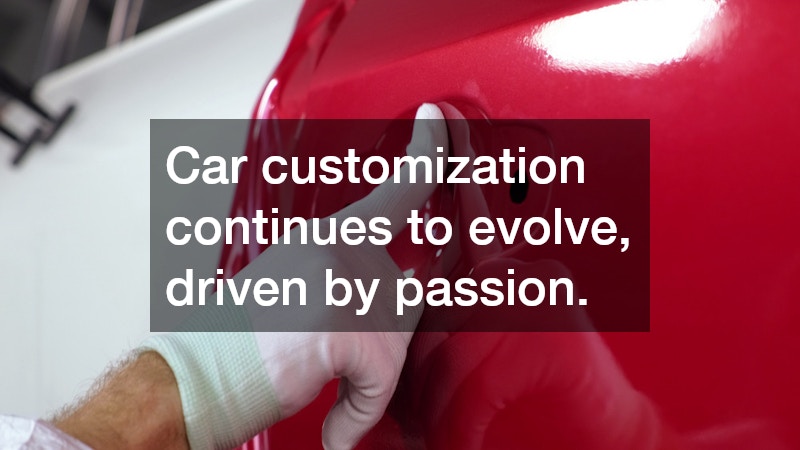
In recent years, car customization has surged in popularity, becoming a vibrant expression of personality and style for countless automotive enthusiasts. This article delves into the most prevailing customization trends, the driving forces behind them, and what the future holds for car customization.
Why is Car Customization Trending?
The Influence of Car Culture
Car culture has deep roots in our society, epitomized by iconic movies like “The Fast and the Furious,” which showcase extensively customized vehicles. These portrayals have inspired countless enthusiasts to personalize their cars, blending cinematic flair with personal taste.
Auto shows also play a pivotal role in spreading car culture, serving as platforms for the latest trends in customization. Enthusiasts gather at these events to share ideas and inspire each other, driving the customization trend forward.
Furthermore, social media has become a powerful tool for showcasing customization projects, where influencers and hobbyists alike display their creations. The widespread sharing of personalized vehicles has fueled a cultural movement, encouraging more individuals to modify their cars as a form of self-expression.
Advancements in Customization Technology
Technological advancements have significantly expanded the horizons of car customization, making sophisticated modifications more accessible and affordable. CNC milling and 3D printing are among the innovations allowing for precise and custom-made parts, from bespoke body kits to intricate interior details.
Moreover, software developments in design and engineering have enabled enthusiasts to visualize modifications before committing to them. Virtual reality and augmented reality tools provide a more interactive approach to customization, facilitating better decision-making.
This technology-driven customization renaissance also includes advancements in paint technology, allowing for longer-lasting and more vibrant finishes. Innovations like these have lowered entry barriers, enabling a broader audience to participate in car personalization trends.
What are the Most Popular Customization Options?
Aesthetic Modifications
One of the most visible forms of car customization is aesthetic modifications, where car wraps and unique paint jobs offer a canvas for creativity. Body kits are also increasingly popular, with enthusiasts often opting to modify their cars’ aerodynamic features to match personal preferences.
Lighting changes, such as custom LED installations, enhance a vehicle’s appearance and are favored for their ability to dramatically alter a car’s look. These upgrades allow owners to express individuality while maintaining the functionality of their vehicles.
In addition to broader aesthetic changes, details like custom wheels and decals are simple yet effective ways to transform a car’s look. These modifications cater to both subtle and extravagant tastes, depending on the owner’s vision and style.
Performance Upgrades
Performance upgrades often attract car enthusiasts aiming to boost their vehicles’ speed, handling, and overall performance. Engine modifications, such as turbocharging or supercharging, can significantly enhance a car’s power output.
Apart from engine tweaks, suspension upgrades are also sought after for better handling and ride quality. Enthusiasts might install specialized dampers or lowering springs to achieve a balance between performance and comfort.
Brake system enhancements are another critical aspect of performance customization, offering improved stopping power and safety. Enthusiasts often upgrade to high-performance brake pads and rotors to complement the increased power of their modified engines.
How do Customizations Impact Vehicle Value?
Positive Impacts on Resale Value
In some cases, customizations can elevate a car’s market appeal, especially when the modifications follow current automotive trends. Custom cars with tasteful modifications often attract enthusiasts willing to pay a premium for unique features.
Well-executed customization projects can enhance the historical and financial value of certain models, particularly in the collector’s market. When aligned with preserving the integrity of the original design, these customizations can yield significant returns upon resale.
For those looking to sell, showcasing professionally documented customization processes can boost potential buyers’ confidence. When modifications add value without compromising the car’s core identity, they can positively impact resale value.
Potential Risks and Depreciation
On the flip side, not all customizations are financially beneficial; some may lead to decreased vehicle value. Modifications that deviate too far from mainstream tastes might narrow the pool of interested buyers when it comes time to sell.
Certain performance upgrades, while enhancing functionality, can deter buyers who prioritize reliability and longevity over modified capabilities. Owners must consider the broader market appeal of their customizations before investing heavily in specific upgrades.
Lastly, the removal of original manufacturer parts can sometimes lead buyers to question a vehicle’s integrity and maintenance history. It’s crucial for sellers to document all changes meticulously, ensuring transparency and maintaining as much of the vehicle’s inherent value as possible.
Car customization continues to evolve, driven by passion, innovation, and a desire for personal expression. Whether for performance, aesthetics, or cultural significance, understanding these trends provides insight into the dynamic world of automotive personalization.

